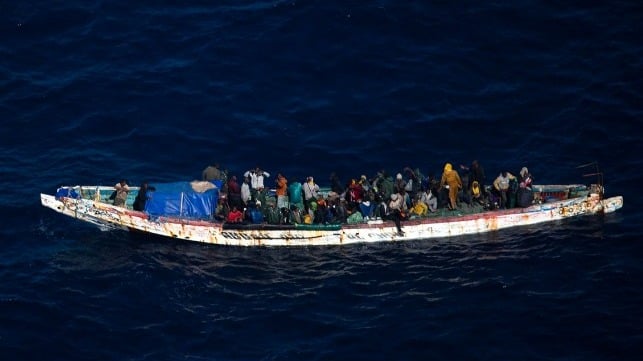19 Smugglers Charged With Throwing Dozens of Passengers Overboard

Police in the Canary Islands have charged 19 people with murder in connection with the deaths of dozens of migrants who went "missing" from a wooden boat on the crossing from Senegal, a route that is always perilous but may have had an additional hazard on this particular voyage.
About 300 people set out from Senegal in August aboard a 20-meter wooden boat, bound for the Canary Islands and the opportunity for EU asylum. On August 24, the rescue boat Guardamar Urania made a long voyage south from Gran Canaria to reach the migrant vessel off Dajla, a town in southern Morocco (or Western Sahara). At the time of intercept and rescue, there were 248 people still alive on the vessel.
Upon return to the dock, the surviving passengers identified 19 individuals as the organizers of the voyage. The survivors alleged that this group of human smugglers "assaulted dozens of people" and even "threw migrant alive into the sea." Anyone who went overboard accidentally was left behind.
The motives behind these killings were twofold, according to police. The organizers allegedly wished to get rid of migrants who they believed to be practitioners of "witchcraft," and thereby responsible for breakdowns, bad weather or other failures on board. Survivors told the police that the smugglers would throw "witches" into the sea whenever misfortune occurred. Others were selected for elimination because they disagreed with the smugglers or protested their circumstances on board.
Based on the number of people who set out and the number who survived to be rescued, prosecutors estimate that the organizers killed at least 30 and likely more than 50 people. According to El Dia, the 19 smugglers face charges of bodily harm, homicide, torture, and assisting illegal immigration.
Even with a well-intentioned crew, the crossing to the Canary Islands is long and dangerous. Those leaving Senegal or Mauritania have a northerly voyage of 1,000 nautical miles to cross in order to reach their destination, though (as in this particular case) SAR forces may reach them much sooner. The hazards in the open Atlantic ocean are severe, and an estimated 10,000 people died on the crossing in 2024, according to aid group Caminando Fronteras.
Spain's naval chief of staff, Admiral General Antonio Pineiro, recently emphasized the government's priority on search and rescue, rather than the pushback campaigns seen in parts of the Mediterranean. "We're not here to fight the cayucos, but to help them," he told El Dia in an interview Friday.
